九年级英语下册Unit1 You Can Write Poetry Lesson1 Poetry,Please冀教版
九年级英语下册Unit1YoucanwritepoetryLesson1-Lesson4同步练习冀教版

Unit 1 You can write poetry Lesson 1-Lesson 4一. 用所给单词的正确形式填空。
1. Have you (write)your poem?2. The policeman saved the boy (brave).3. The (warm) makes the trees green.4. The room is too (noise).5. The boy is too (sleep). He wants to go to bed.6. The (friend) between us will be for ever.7. Please tell us yo ur (think).8. The joke is (fun). We all laugh.9. Where is the (happy)? It’s in your own hands.10. My mother was (satisfy) with what I did.11. Don’t let him (go) there alone.12. Have you finished (read) the book?13. All the students are busy (clean) the room.14. Did you hear the baby (cry) in the next room?15. Jack went to school without (take) his backpack.二. 单项填空1. your key is in your bag.A. MayB. May beC. MaybeD. And2. The boy wants a doctor.A. beB. to beC. isD. will be3. We are all tired after .A. runB. ranC. we runD. running4. D avid is as as Jack.A. careB. carefulC. more carefulD. the most careful5. Jim jumps in his class.A. highB. higherC. highestD. more high6. This story made me my past.A. think ofB. thought ofC. to think ofD. think over7. We are all at the film.A. exciting; excitedB. exciting; excitingC. excited; excitedD. excited; exciting8. You need your room every day.A. cleanB. cleaningC. to cleanD. cleaned9. Neither he nor I in Class Two.A. amB. isC. areD. be10. I don’t know .A. how beginB. what writeC. where to goD. to choose which三. 完形填空Mrs. Black was a famous musician several years ago. She 1 music at a schooland her students did well in their lessons. They liked her very much. 2 the oldwoman sta ys at home with her husband. The old man looks after his wife well andshe is 3 worried about anything. Her students 4 forget their teacher when they win their prizes. She often 5 some presents on her birthday and at Christmas ,and she is very 6 .Just like some old people, Mrs. Black finds that her 7 is falling. Sometimes she forgets 8 she did or will do . It often gets her in 9 . Her 10 has noticed it and asked her to see a famous doctor who lives in the capital. He b ought two tickets 11 London and told her to put 12 into her handbag while she was playing the piano. The next morning, when they reached the 13 just in time to catch plane, Mrs. Black said, “I wish we’d brought the 14 with us.”“Don’t be a fool, dear!” said Mr. Black. “We a re not going to hold a concert, but to see a 15 .”“I know,” she said , “but I’ve left the tickets on it!”1. A. loved B. taught C. enjoyed D. studied2. A. Now B. Once C. Still D. Soon3. A. always B. often C. never D. sometimes4. A. can’t B. have to C. must D. would5. A. buys B. prepares C. makes D. receives6. A. nervous B. worried C. sad D. happy7. A. sight B. hearing C. interest D. memory8. A. what B. how C. why D. where9. A. place B. danger C. trouble D. surprise。
最新-九年级英语下册 Unit 1 You can write poetry Le
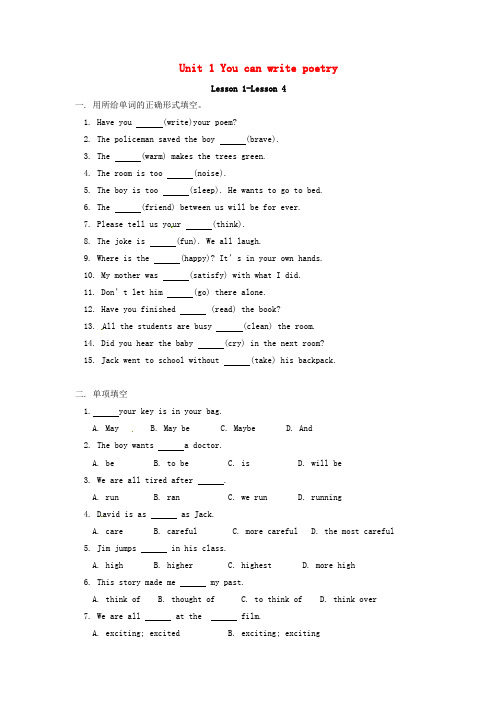
Unit 1 You can write poetryLesson 1-Lesson 4一. 用所给单词的正确形式填空。
1. Have you (write)your poem?2. The policeman saved the boy (brave).3. The (warm) makes the trees green.4. The room is too (noise).5. The boy is too (sleep). He wants to go to bed.6. The (friend) between us will be for ever.7. Please tell us yo ur (think).8. The joke is (fun). We all laugh.9. Where is the (happy)? It’s in your own hands.10. My mother was (satisfy) with what I did.11. Don’t let him (go) there alone.12. Have you finished (read) the book?13. All the students are busy (clean) the room.14. Did you hear the baby (cry) in the next room?15. Jack went to school without (take) his backpack.二. 单项填空1. your key is in your bag.A. MayB. May beC. MaybeD. And2. The boy wants a doctor.A. beB. to beC. isD. will be3. We are all tired after .A. runB. ranC. we runD. running4. D avid is as as Jack.A. careB. carefulC. more carefulD. the most careful5. Jim jumps in his class.A. highB. higherC. highestD. more high6. This story made me my past.A. think ofB. thought ofC. to think ofD. think over7. We are all at the film.A. exciting; excitedB. exciting; excitingC. excited; excitedD. excited; exciting8. You need your room every day.A. cleanB. cleaningC. to cleanD. cleaned9. Neither he nor I in Class Two.A. amB. isC. areD. be10. I don’t know .A. how beginB. what writeC. where to goD. to choose which三. 完形填空Mrs. Black was a famous musician several years ago. She 1 music at a school and her students did well in the ir lessons. They liked her very much. 2 the old woman sta ys at home with her husband. The old man looks after his wife well and she is 3 worried about anything. Her students 4 forget their teacher when they win their prizes. She often 5 some presents on her birthday and at Christmas , and she is very 6 .Just like some old people, Mrs. Black finds that her 7 is falling. Sometimes she forgets 8 she did or will do . It often gets her in 9 . Her 10 has noticed it and asked her to see a famous doctor who lives in the capital. He bought two tickets 11 London and told her to put 12 into her handbag while she was playing the piano. The next morning, when they reached the 13 just in time to catch plane, Mrs. Black said, “I wish we’d brought the 14 with us.”“Don’t be a fool, dear!” said Mr. Black. “We are not going to hold a concert, but to see a 15 .”“I know,” she said , “but I’ve left the tickets on it!”1. A. loved B. taught C. enjoyed D. studied2. A. Now B. Once C. Still D. Soon3. A. always B. often C. never D. sometimes4. A. can’t B. have to C. must D. would5. A. buys B. prepares C. makes D. receives6. A. nervous B. worried C. sad D. happy7. A. sight B. hearing C. interest D. memory8. A. what B. how C. why D. where9. A. place B. danger C. trouble D. surprise10. A. husband B. daughter C. son D. student11. A. for B. in C. from D. of12. A. it B. them C. this D. that13. A. airport B. bus stop C. station D. bar14. A. money B. music C. tickets D. piano15. A. doctor B. film C. play D. house四. 阅读理解There was a small village by the sea in Amer ica. Every summer lots of people came here to spend their holidays. But a few of them came here only to end their lives. Two months ago right here a young woman jumped into the sea in the darkness of the night. When she was taken up from the sea, nothing could make her come to life. From then on, the people in the village began to pay more attention(注意) to each of the visitors. If someone looked unhappy or worried, they would watch him all day long with care. They would never let the same thing happen again.A week later, came several visitors. Among them there was a young woman of twenty years old. One day she looked different from others. She went out alone at night. She was found just by a villager made no noise and followed her. When the young woman was walking to the beach, the villager rushed at her and tried hard to pull her back . “Let me go. Don’t pull me!” cried the young woman, “I was playing on th e beach this afternoon. Now I can’t find the key to my suitcase. I think it must be left here.” “But why won’t you look for it tomorrow morning?” said the villager. “Tomorrow morning I’ll leave here and catch the early bus to New York. I must leave before the day break s.”When the villager heard this, he had a good laugh and helped her look for the key in the moonlight.1. The small village was the sea.A. far fromB. nearC. fromD. to2. of the visitors came to this village in order to die.A. FewB. LittleC. A littleD. Several3. Why did a young woman go out alone at night one day?A. To go for a walk.B. To go swimming.C. To look for her key.D. To end her life.4. The villager rushed at the young woman because he wan ted to .A. save herB. ask her for somethingC. kill herD. frighten her5. The woman looked for the key at night because .A. she couldn’t get up early the next morningB. she had something important to doC. she had little time to look for it the next morningD. she wanted to leave the village at once【试题答案】一. 1. written 2. bravely 3. warmth 4. noisy 5. sleepy 6. friendship 7. thought8. funny 9. happiness 10. satisfied 11. go 12. reading 13. cleaning 14. cry15. taking二. 1~5 CBDBC 6~10 ADCAC三. 1~5 BACAD 6~10 DDACA 11~15 ABADA四. 1~5 BDCAC。
九年级_冀教版九年级下册 Unit1 You Can Write Poetry

be away 表状态,后可加一段时间,表示此动作已延续一 段时间.
注: for+一段时间
since+一个时间点
Eg. He has been away
since three days ago.
--How long has he ____ here?
--He has ____ here for several hours.
e.g. ① There are plenty of eggs in the market.
② I need plenty of time to finish my homework.
Language Points
6.I would like to make a poster about smoking make a poster about 做一张有关…的海报
Language Points
9.If I breathe too much cigarette smoke, I get a headache.
too much 修饰名词,much too 修饰形容词或 副词
口诀:too much, much too, 去掉前词看后头; much可接不可数(n.), too则修饰形(adj.)或副(adv.)。
增加了高血压的危险。
Lesson 4 Don’t smoke, please.
学习目标
❖1.掌握本课的短语、身体问候及吸烟 有害健康的句型.
❖2.认识吸烟的危害,远离香烟.
Ⅰ、Discuss:
1、Is there anyone smoke in your family ?
2、Have you ever seen students smoke in your school ?
最新九年级英语下册Unit1YouCanWritePoetryLesson2PoemsAboutNa
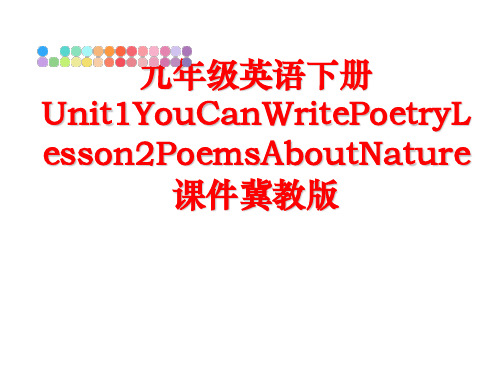
He gave us a very clear explanation. This picture is very clear. Are you clear?
Language notes:
3. Sun, warm and golden, softly kissing the earth.
It is about nature. It is a description of a spring scene.
Read carefully and find the answers:
1.What ideas do you know for the nature from the reading?
a winter scene a forest scene a morning scene
a mountain scene a desert scene a storm scene
2.How to write your poem about the scene?
First start each line in your poem with a word related to the scene, something you would see: hills, flowers, trees or sun.
No. I ___w__il_l _w_r_i_te____(write) them this afternoon.
Answer the following questions:
1. When you read this poem, do you see a picture in your mind?
九年级英语下册Unit1 You Can Write Poetry Lesson2 Poems About Nature冀教版
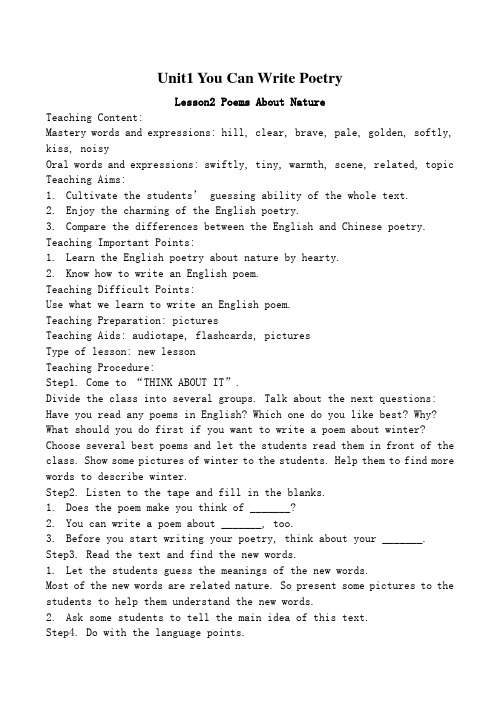
Unit1 You Can Write PoetryLesson2 Poems About NatureTeaching Content:Mastery words and expressions: hill, clear, brave, pale, golden, softly, kiss, noisyOral words and expressions: swiftly, tiny, warmth, scene, related, topic Teaching Aims:1. Cultivat e the students’ guessing ability of the whole text.2. Enjoy the charming of the English poetry.3. Compare the differences between the English and Chinese poetry. Teaching Important Points:1. Learn the English poetry about nature by hearty.2. Know how to write an English poem.Teaching Difficult Points:Use what we learn to write an English poem.Teaching Preparation: picturesTeaching Aids: audiotape, flashcards, picturesType of lesson: new lessonTeaching Procedure:Step1. Come to “THINK ABOUT IT”.Divide the class into several groups. Talk about the next questions: Have you read any poems in English? Which one do you like best? Why? What should you do first if you want to write a poem about winter? Choose several best poems and let the students read them in front of the class. Show some pictures of winter to the students. Help them to find more words to describe winter.Step2. Listen to the tape and fill in the blanks.1. Does the poem make you think of _______?2. You can write a poem about _______, too.3. Before you start writing your poetry, think about your _______. Step3. Read the text and find the new words.1. Let the students guess the meanings of the new words.Most of the new words are related nature. So present some pictures to the students to help them understand the new words.2. Ask some students to tell the main idea of this text.Step4. Do with the language points.Make sentences with the new words we learn in this text.Ask if someone can tell a story with the words we learn today. Encourage them to stand in front of the class and tell his story to us.Step5. Reading taskEncourage the students to ask questions about this text.Finish the task in groups. Let the students design questions and exchange them in groups. They can ask questions like this:1. What are your ideas for a nature poem?2. What can you do to describe about something?Step6. Activities.Work in groups.Write a poem about the two pictures. Finish a poem. Then each student in the group correct it before reading it to the class.Step7. Come to “LET’S DO IT!”The task is similar to the step6. Finish it in class. Try to write a poem about one of the seasons. The teacher shows some pictures about the seasons to the students.Step8. Homework1. Finish off the exercises in activity book.2. Go on the next reading in the student book.Summary:It is fun and interesting to write a poem in English. The teacher tries to write a poem and presents it to the class. Let the students correct it if they have any good ideas. Some students are interested in English, and they are also interested in poems. So give them more chances to create their minds.。
九年级英语Unit 1 You can write poetry冀教版知识精讲
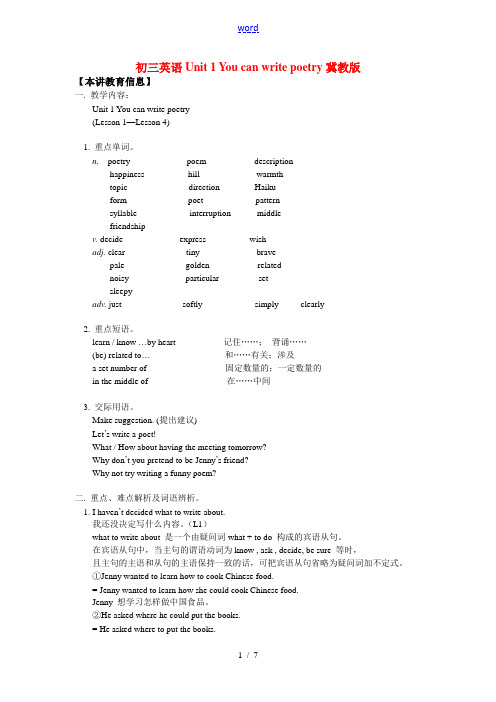
初三英语Unit 1 Y ou can write poetry冀教版【本讲教育信息】一. 教学内容:Unit 1 You can write poetry(Lesson 1—Lesson 4)1. 重点单词。
n. poetry poem descriptionhappiness hill warmthtopic direction Haikuform poet patternsyllable interruption middlefriendshipv. decide express wishadj. clear tiny bravepale golden relatednoisy particular setsleepyadv. just softly simply clearly2. 重点短语。
learn / know …by heart 记住……;背诵……(be) related to…和……有关;涉及a set number of 固定数量的;一定数量的in the middle of 在……中间3. 交际用语。
Make suggestion. (提出建议)Let’s write a poet!What / How about having the meeting tomorrow?Why don’t you pretend to be Jenny’s friend?Why not try writing a funny poem?二. 重点、难点解析及词语辨析。
1. I haven’t decided what to write about.我还没决定写什么内容。
(L1)what to write about 是一个由疑问词what + to do 构成的宾语从句。
在宾语从句中,当主句的谓语动词为know , ask , decide, be sure 等时,且主句的主语和从句的主语保持一致的话,可把宾语从句省略为疑问词加不定式。
九年级英语下册 Unit 1 You Can Write Poetry Lesson

Lead in:
1. What did Jenny, Brian and Danny study in school this week? They studied poetry.
2. How many kinds of poems did they read? Poems about nature Haiku Limerick Five-line poems
Language Points:
1. thought n. 想法,思想 The man is in deep thought. What is your thought about the problem? Writing a poem is a way to express one’s thought. 2. bottom n. 底,底部 We can see the bottom of the lake through the clear water. 3. It is (adj.) + to do sth. It is interesting to skate in winter. It is important to learn English well. It is hard to answer the question.
5. What are five-line poems about? What does a five-line poem follow? It has five lines. Each line has a set number of words. The first line has one word. The second line has two words. The third, or middle line has three words. The fourth line has four words. The last line has one word.
2019-2020年九年级英语下册 Unit 1 You Can Write Poetry Lesson 1教案 冀教版

2019-2020年九年级英语下册 Unit 1 You Can Write Poetry Lesson1教案冀教版Teaching Content:Mastery words and expressions: poem, decide, nature, express, learn/know …by heart, pleased, happiness, shutTeaching Aims:1.Learn about the poems in foreign countries.2.Know the differences between Chinese and foreign poetry.Teaching Important Points:1.How to make suggestions.2.The grammar: infinitives.3.Some words and expressions: learn/know …by heartTeaching Difficult Points:The grammar: infinitivesTeaching Preparation: picturesTeaching Aids: audiotape, flashcards, picturesType of lesson: new lessonTeaching Procedure:Step1: e to “THINK AOBUT IT”.Let the students talk about the questions in groups.1.Have you written a poem in Chinese? Is it hard? Why?2.What kinds of poetry do you like best?After a while, let the students in each group present their ideas to the class in front of the class.Step2: Listen to the tape and find the answers to the questions:1. Have Brian finished his poem?2.What’s Danny’s poem abou t?Step3: Reading task:1. Read the text and underline the new words in this lesson.Present the meanings of the words with the help of the media puter. We can use our body language if necessary.3. Tell the main idea of this lesson.Step4: Read the text again and decide the statements are true or false.1. Jenny wrote a Chinese poem.2.Brian wrote a poem about nature.3. Danny learned his poem by heart.Step5: Deal with the language points.How to make a suggestion:The infinitives:I haven’t decided what to write about.Would you like to hear my poem?Do you really want to hear?I don’t need to read it.Let the students sum the use of infinitives of this lesson. Then encourage them to make more sentences with the grammar.Step5: Activities1. Divide the class into several groups. Then let them translate a Chinese poem written by Li Bai or other famous poets. Then pare the translations of the groups. Let’s see which is the best.2. Each group writes an English poem about the familiar things around us. Then let them change the poems in groups. They may give their own advice to the poems written by others.Step6: Describe the picture in English.Ask the students work in their formal groups. Then let them read their poems in class loudly.Step7: e to “LET’S DO IT”.Work with a partner. Let the students talk about the question: which do you think is more difficult to understand, English poetry or Chinese poetry?All of the students have seen much Chinese poetry, but few of them have seen Englishpoetry. So present the students several English poems. Let them discuss the mean ideas of the poems. Then let them finish the task.Step8: Homework1.Finish off the activity book.2.Get more information about the English poetry after class.Summary:The students more little of the English, so that the teacher provides them more information about the English poetry is very necessary. We can use the Internet to help us. The teacher should stimulate the students’ interests about the English poetry. The students can have more time to search more information on the Internet after class.。
九年级英语下册Unit1YouCanWritePoetry冀教版
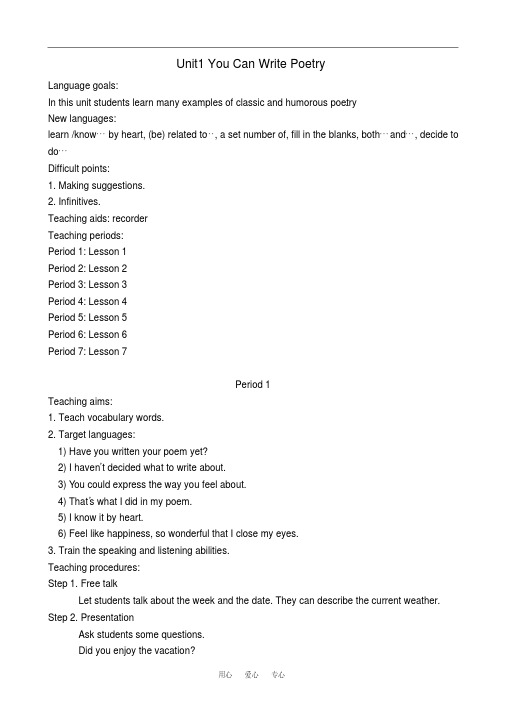
What kind of poetry is Jenny going to write? Why? 2. Play the audiotape. Have the class follow along in their texts. Step 4. Discussing Divide the class into small groups. Ask each group to discuss the reading, using as much English as possible. Ask the students to discuss Dann’sy poem“The Donut”. Step 5. Let’s Do It Discuss the question with a partner: which is more difficult to understand, English poetry or Chinese poetry? You may begin with one of these phrases: Chinese / English poetry is harder/easier, becau…se I prefer Chinese/English poetry, because… Step 6. Homework 1. Revise the vocabulary words in this lesson. 2. Read the poem“The Donut”and try to recite it.
九年级英语下册 Unit 1 You Can Write Poetry Lesson 2教案 冀教版

Lesson 2: Poems About NatureiuTeaching Content:Mastery words and expressions: hill, clear, brave, pale, golden, softly, kiss, noisy Oral words and expressions: swiftly, tiny, warmth, scene, related, topic Teaching Aims:1. Cultivate the students’ g uessing abi lity of the whole text.2. Enjoy the charming of the English poetry.3. Compare the differences between the English and Chinese poetry. Teaching Important Points:1. Learn the English poetry about nature by hearty.2. Know how to write an English poem.Teaching Difficult Points:Use what we learn to write an English poem.Teaching Preparation: picturesTeaching Aids: audiotape, flashcards, picturesType of lesson: new lessonTeaching Procedure:Step1: Come to “THINK ABOUT IT”.Divide the class into several groups. Talk about the next questions:Have you re ad any poems in English? Which o ne do you like best? Why?What should you do first if you want to write a poem about winter?Choose several best poems and let the students read them in front of the class. Show some pict ures of winter to the students. Help them to find more words to describe winter.Step2: Listen to the tape and fill in the blanks.1. Does the poem make you think of _______?2. You can write a poem about _______, too.3. Before you start writing your poetry, think about your _______.Step3: Read the text and find the new words.1. Let the students guess the meanings of the new words.Most of the new words are related nature. So present some pictures to the students to help them understand the new words.2. Ask some students to tell the main idea of this text.Step4: Do with the language points.Make sentences with the new words we learn in this text.Ask if someone can tell a story with the words we learn today. Encourage them to stand in fr ont of the class and tell his story to us.Step5: Reading taskEncourage t he students to ask questions about this text.Finish the task in groups. Let the students design questions and exchange them in groups. They can ask questions like this:1. What are your ideas for a nature poem?2. What can you do to describe about something?Step6: Activities.Work in groups.Write a poem about the two pictures. Finish a poem. Then each student in the group correct it before reading it to the class.Step7: Come to “LET’S DO IT!”The task is similar to the step6. Finish it in class. Try to write a poem about one of the seasons. The teacher shows some pictures about the seasons to the students. Step8: Homework1. Finish off the exercises in activity book.2. Go on the next reading in the student book.Summary:It is fun and interesting to write a poem in English. Th e teacher tries to write a poem and presents it to the class. Let the students correct it if they have any good ideas. Some students are interested in English, and they are also interested in。
英语:Unit 1 《You can write poetry》教案(3)(冀教版九年级下)
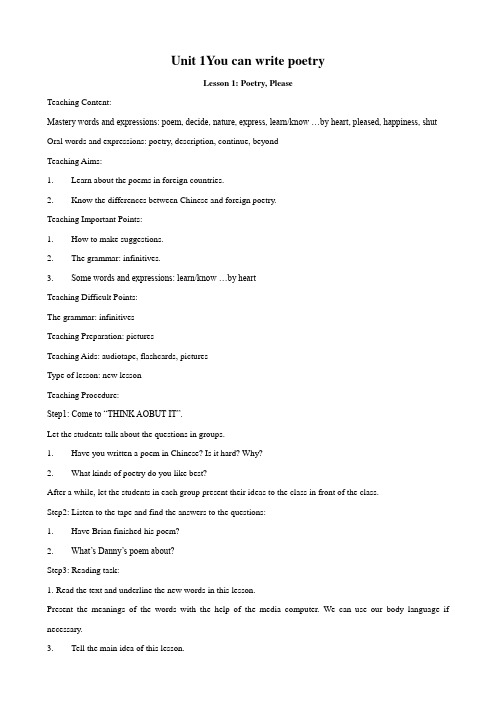
Unit 1You can write poetryLesson 1: Poetry, PleaseTeaching Content:Mastery words and expressions: poem, decide, nature, express, learn/know …by heart, pleased, happiness, shut Oral words and expressions: poetry, description, continue, beyondTeaching Aims:1. Learn about the poems in foreign countries.2. Know the differences between Chinese and foreign poetry.Teaching Important Points:1. How to make suggestions.2. The grammar: infinitives.3. Some words and expressions: learn/know …by heartTeaching Difficult Points:The grammar: infinitivesTeaching Preparation: picturesTeaching Aids: audiotape, flashcards, picturesType of lesson: new lessonTeaching Procedure:Step1: Come to “THINK AOBUT IT”.Let the students talk about the questions in groups.1. Have you written a poem in Chinese? Is it hard? Why?2. What kinds of poetry do you like best?After a while, let the students in each group present their ideas to the class in front of the class.Step2: Listen to the tape and find the answers to the questions:1. Have Brian finished his poem?2. What’s Danny’s poem about?Step3: Reading task:1. Read the text and underline the new words in this lesson.Present the meanings of the words with the help of the media computer. We can use our body language if necessary.3. Tell the main idea of this lesson.Step4: Read the text again and decide the statements are true or false.1. Jenny wrote a Chinese poem.2. Brian wrote a poem about nature.3. Danny learned his poem by heart.Step5: Deal with the language points.How to make a suggestion:Maybe you could write a description of your favourite place.The infinitives:I haven’t decided what to write about.Would you like to hear my poem?Do you really want to hear?I don’t need to read it.Let the students sum the use of infinitives of this lesson. Then encourage them to make more sentences with the grammar.Step5: Activities1. Divide the class into several groups. Then let them translate a Chinese poem written by Li Bai or other famous poets. Then compare the translations of the groups. Let’s see which is the best.2. Each group writes an English poem about the familiar things around us. Then let them change the poems in groups. They may give their own advice to the poems written by others.Step6: Describe the picture in English.Ask the students work in their formal groups. Then let them read their poems in class loudly.Step7: Come to “LET’S DO IT”.Work with a partner. Let the students talk about the question: which do you think is more difficult to understand, English poetry or Chinese poetry?All of the students have seen much Chinese poetry, but few of them have seen English poetry. So present the students several English poems. Let them discuss the mean ideas of the poems. Then let them finish the task. Step8: Homework1. Finish off the activity book.2. Get more information about the English poetry after class.Summary:The students more little of the English, so that the teacher provides them more information about the Englishpoetry is very necessary. We can use the Internet to help us. The teacher should stimulate the students’ intere sts about the English poetry. The students can have more time to search more information on the Internet after class.Lesson 2: Poems About NatureTeaching Content:Mastery words and expressions: hill, clear, brave, pale, golden, softly, kiss, noisyOral words and expressions: swiftly, tiny, warmth, scene, related, topicTeaching Aims:1. Cultivate the students’ guessing ability of the whole text.2. Enjoy the charming of the English poetry.3. Compare the differences between the English and Chinese poetry.Teaching Important Points:1. Learn the English poetry about nature by hearty.2. Know how to write an English poem.Teaching Difficult Points:Use what we learn to write an English poem.Teaching Preparation: picturesTeaching Aids: audiotape, flashcards, picturesType of lesson: new lessonTeaching Procedure:Step1: Come to “THINK ABOUT IT”.Divide the class into several groups. Talk about the next questions:Have you read any poems in English? Which one do you like best? Why?What should you do first if you want to write a poem about winter?Choose several best poems and let the students read them in front of the class. Show some pictures of winter to the students. Help them to find more words to describe winter.Step2: Listen to the tape and fill in the blanks.1. Does the poem make you think of _______?2. You can write a poem about _______, too.3. Before you start writing your poetry, think about your _______.Step3: Read the text and find the new words.1. Let the students guess the meanings of the new words.Most of the new words are related nature. So present some pictures to the students to help them understand the new words.2. Ask some students to tell the main idea of this text.Step4: Do with the language points.Make sentences with the new words we learn in this text.Ask if someone can tell a story with the words we learn today. Encourage them to stand in front of the class and tell his story to us.Step5: Reading taskEncourage the students to ask questions about this text.Finish the task in groups. Let the students design questions and exchange them in groups. They can ask questions like this:1. What are your ideas for a nature poem?2. What can you do to describe about something?Step6: Activities.Work in groups.Write a poem about the two pictures. Finish a poem. Then each student in the group correct it before reading it to the class.Step7: Come to “LET’S DO IT!”The task is similar to the step6. Finish it in class. Try to write a poem about one of the seasons. The teacher shows some pictures about the seasons to the students.Step8: Homework1. Finish off the exercises in activity book.2. Go on the next reading in the student book.Summary:It is fun and interesting to write a poem in English. The teacher tries to write a poem and presents it to the class. Let the students correct it if they have any good ideas. Some students are interested in English, and they are also interested in poems. So give them more chances to create their minds.Lesson 3: Say It in ThreeTeaching Content:Mastery words and expressions: direction, form, poet, simply, a set number of, middle, clearly, dark, sleepy, unexpected, frog, feelingOral words and expressions: petal, cherry, grebe, Matsuo Basho, Haiku, particular, pattern, set, syllable, interruption, plop, splash, limerick, adverbTeaching Aims:1. Cultivate the students’ reading comprehension.2. Know more about the foreign culture.3. Compare the differences between the Chinese and Japanese poems.Teaching Important Points:1. Learn about an old style of Japanese poem: Haiku.2. Know some styles of poems: Haiku, Nature Poem and Limerick.Teaching Difficult Points:The old form of Japanese poetry: Haiku.Teaching Preparation: picturesTeaching Aids: audiotape, flashcards, picturesType of lesson: new lessonTeaching Procedure:Step1: Show pictures of Japanese poets and poems. Then introduce Haiku to the students. The teacher can find some music to match the poem.Step2: Listen to the tape and fill in the blanks.Usually Haikus are about _______.Haiku always has ______ lines.The first line of a Haiku has _______ syllables.Check the answers in class in oral.Step3: Read the text and guess the meanings of the new words.Sometimes some new words are too hard to understand, so the teacher can find some related pictures to help them. If the students bring some pictures about nature to the class, let them show them in front of the class.Step4: Read the text and find the answers to the questions:1. Do Haikus tell a story?2. What’s a syllable?Step5: Come to “PROJECT”.1. Divide the class into groups to finish the task.2. Finish the three poems in the text. Use the sentence: I need a ______. Let the others give the answers, onestudent write the words down.3. After finishing the poems, read it to the class. All the groups have different poems. Do they sound funny?4. Decide a subject by each group. Then make a pattern according to the subject. Then finish the poem as the models in the text.5. Read the poem to the class.Step6: Homework1. Finish off the exercises in activity book.2. Go on the next reading in the student book.Summary:Some students may think the foreign poems are funny and easy. The teacher may also think so. It is possible for the students to create poems like those we have learned in the class. Give them more chances to create their minds. The teacher can try some poems, too. The class and the teacher can find much fun in learning foreign poems.Lesson 4: The WishTeaching Content:Mastery words and expressions: wish, in the middle of, stone, friendship, reciteTeaching Aims:1. Learn how to sing foreign songs.2. Know more about the foreign culture.3. Learn about the styles of all kinds of poems in other countries.Teaching Important Points:1. Master the main idea of the song.2. Grasp the use of “without”.3. Make a similar song like this.Teaching Difficult Points:The use of “without”.Teaching Preparation: picturesTeaching Aids: audiotape, flashcards, picturesType of lesson: new lessonTeaching Procedure:Step1: Listen to the tape for several times. At the same time, ask the students to sing after it. Test how long they grasp the rhythm of the song.Step2: Read the song as a poem. Let the students read the poem as a lyric line by line.Step3: Make a poem like this.Divide the class into several groups. Make the similar this. Every group makes a poem. Then present it to the class. If the others have other better ideas, they can give their advice.Step4: Do with the language points.Make sentences with the important phrases: in the middle, without.S1: Danny sits in the middle of the classroom.S2: There is a stone in the middle of the road.S3: Fish can’t live without water.S4: We can’t finish the work without your help.Step5: Come to “PROJECT”.Finish the task in groups.1. Everyone in the group chooses one pattern of these poems and writes one by yourself.2. After writing the poem, show it to the others in the group.3. Each exams the others’ poems and gives his advice.4. After examine all of their poems, change them with the other group. Give their reasonable advice.5. The teacher gives them chances to express themselves.Step6: Homework.1. Finish off the exercises in the activity book.2. Go on the next reading in the student book.Summary:The students are familiar to the Chinese poetry, but the foreign ones are hard for them. When the students practice, the teacher should give them a hand if necessary. It is a challenge for the Chinese students to write foreign poems. Encourage them more in order to stimulate their interests of learning English.Lesson 5: That’s a Funny Limerick!Teaching Content:Mastery words and expressions: both…and…Oral words and expressions: blank, motionTeaching Aims:1. Cultivate the students’ ability of learning by themselves.2. Master one of the patterns of foreign poems.3. Compare the differences between the Chinese and foreign poetry.Teaching Important Points:1. Know more about the limerick.2. Learn more words about describing weight, size, feeling and age.Teaching Difficult Points:Know how to write a limerick.Teaching Preparation: picturesTeaching Aids: audiotape, flashcards, picturesType of lesson: new lessonTeaching Procedure:Step1: Come to “THINK ABOUT IT”.Let the students answer the questions in class in oral.1. Ask several students to say funny sayings in English. If they can’t express themselves in English, they can say them in Chinese.2. Let some students tell jokes. Encourage them to tell jokes in English.Step2: Listen to the tape and fill in the blanks.1._______ and _______ help Jenny fill in the blanks in her limerick.2. They choose _______ to describe the weight.Step3: Read and get the main idea of the text.1. Let the students scan the text. Then tell the main idea of the text.2. Find the new words and guess their meanings according to the text.Step4: Do with some language points.Either…or…, both…and…Let some students make sentences with the help of the pictures.S1: He eats either apples or oranges.S2: Either he or I am good at dancing.S3: Both his teachers and his parents love him.S4: Susan loves both reading and listening.Step5: Come to “LET’S DO IT”.Limerick is a kind of poem that has a pattern.Study the “Limerick”. Get the results.1. There are five lines in the limerick.2. From Jenny’s limerick, we can see the first, second and fifth lines have rhyme.Look in the library or search on the Internet to find some information about limericks. Show them to the class and let them find the pa tterns of “limerick”.3. Let different groups act the dialogue out in front of the class.Step6: Homework1. Finish off the exercises in activity book.2. Go on the next reading in the student book.Summary:Limerick is fun. It’s interes ting for the students. The students may like to practice it very much. Everyone writes a limerick. The class will be full of laughter. Ask the students to begin the similar dialogue in class to practice the limerick.Lesson 6: Say It in FiveTeaching Content:Mastery words and expressions: create, single, thoughtOral words and expressions: fur, stretch, hum, adjectiveTeaching Aims:1. Improve the students’ listening and reading abilities.2. Know more about the foreign poetry.3. Learn the American five-line poems.Teaching Important Points:1. Grasp the pattern of the five-line poem.2. Use the pattern to describe something.Teaching Difficult Points:Use the pattern to describe something.Teaching Preparation: picturesTeaching Aids: audiotape, flashcards, picturesType of lesson: new lessonTeaching Procedure:Step1: Come to “THINK ABOUT IT”.We all know Chinese poetry has different kinds of patterns. Let the students give some examples.Step2: Listen to the tape and answer the following questions:1. Who created the five-line poem?2. How many poems does the text show us?Finish the listening part in class in oral.Step3: Reading task:Read and tell the main idea of the text. This is a game to practice the students’ memories. It can improve the students’ summary abilities.Step4: Read and decide the statements are true or false.1. Today we learn a pattern of French poetry.2. The second line has three words.3. The topic of the poem is a noun.Finish the questions in class in oral.Step5: Activity:Show some pictures to the students. Let them the favourite one to describe. They can work in pairs. Then show their poems to the class.It’s easy to finish the task, but it is hard to do it well.Step6: Come to “LET’S DO IT”.Work in groups of three or four students.1. Say the differences between a Haiku and a five-line poem. Say about their different forms and different patterns.A haiku is just a description of a scene. It is simply what is happening in this place, at this moment.Five-line poem has five lines. It is always about a single topic. Each line has a set number of words. The first line has one word. The second line has two words. The third, or middle, line has three words. The fourth line has four words. The last line has one word.2. Finish the task in groups. Choose one topic as they like. Then exchange the poems among the groups. Step7: Homework1. Finish off the exercises in activity book.2. Ask the students to find more topics after class.Summary:We learn different kinds of foreign poetry. They are limericks, five-line poems and Haiku. The students may think they are very interesting. Some students have surprising poems that you didn’t think of. Giv e them more chancesto practice so that they can create their minds.Lesson 7: Trading PoemsTeaching Content:Mastery words and expressions: awake, riddleOral words and expressions: avenueTeaching Aims:1. Know more about the foreign culture.2. Create the student’s cooperation ability.Teaching Important Points:1. Master the written style, letter.2. Learn the differences between Chinese and foreign poetry.Teaching Difficult Points:Write a letter with what we learn in this unit.Teaching Preparation: picturesTeaching Aids: audiotape, flashcards, picturesType of lesson: new lessonTeaching Procedure:Step1: Show the type of the letter. Let the students sum how to write a letter. Pay attention to the written style of the envelope.Step2: Listening taskListen to the tape and fill in the blanks.1. _______ is a beautiful way to express thoughts and feelings.2. Danny’s teacher says Danny’s always saying _______ things.Let the students listen to the tape and finish the listening task in class in oral.Step3: Read the text and answer the following questions:1. Does Danny think it is hard to write a poem?2. Did Li Ming write back to Danny?Ask the students scan the text and answer the questions.Step4: PracticeWrite a letter to your friends about what we learn in this unit. The teacher encourages them to write a poem to their friend, too. It’s hard, so they can choose any topic that they like. They only write for friends. We don’t needto demand too much.Step5: Co me to “LET’S DO IT”.Finish the task in groups of three or four students. In a small group, write a poem like the one in Li Ming’s postcard.1. First, choose a word your group like. They can choose any word that they like. Because the task is to begina poem with the letters in this word, everyone can write a word on a piece of paper. Then they can choose one from these.2. Use each letter in this word to begin a line of our poem. Everyone in the group can write different poem according to the word. Then they can exchange their poems and give advice to each other.3. Make a poster to display your poems on the wall. It takes some time to design the poster.4. Which one do you think is the best? Give your reasons.Let the students choose the best poem that they like best and give their reasons in front of the class.Step6: Homework1. Finish off the exercises in activity book.2. Go on the next reading in the student book.Summary:The last poem that we learn in Li Ming’s postcard is very interestLesson 8: Unit ReviewTeaching Content:Mastery words and expressions from Lesson1 to Lesson7.Oral words and expressions from Lesson1 to Lesson7.Teaching Aims:1. Improve the students’ ability of using what we learn in this unit.2. Stimulate the students’ mind of learning about Chinese and foreign poetry.3. Know the differences between Chinese and foreign poetry.Teaching Important Points:1. Making suggestions.2. Master the use of infinitives.Teaching Difficult Points:The use of infinitives.Teaching Preparation: picturesTeaching Aids: audiotape, flashcards, picturesType of lesson: review lessonTeaching Procedure:Step1: Listen to some beautiful poems in Chinese or in English. Music usually creates atmosphere for the students.If anyone can recite some English poems, the teacher can give them chances to recite in front of the class.Step2: Do the exercises in Lesson8. At the same time, the teacher walks in the classroom and see if they have any trouble to solve.Step3: Let the students write some difficulties on the blackboard. Then let’s try to solve them together.The most important grammar is the infinitive. For example:I haven’t decided what to write.Li Ming has something important to do, so he can’t come to your party.My wish is to go to space.It’s not easy to walk against a strong wind.Step4: Practice the spoken English.Make a similar dialogue according to the Speaking the Language part. It’s how to make suggestions.Ask the students work in pairs to make up dialogues like this. Then present it in front of the class.Step5: Play “Story Game’.Work in groups to finish the task. When the students play the game, the teacher walks around the classroom and see if any group needs help.At last, ask each group presents their stories to the others in front of the class. Whose story is the funniest?Step6: Homework1. Finish the exercises in activity book.2. Preview the next lesson.Summary:Poetry is an important part of culture. So it is useful to learn it well. This unit gives us opportunities to practice. Making suggestions is important, too. So let the students make dialogues to practice it. The teacher should pay attention to the infinitives in this unit. We should practice more in this class.。
冀教版英语九下unit 1 you can write poetryword学案
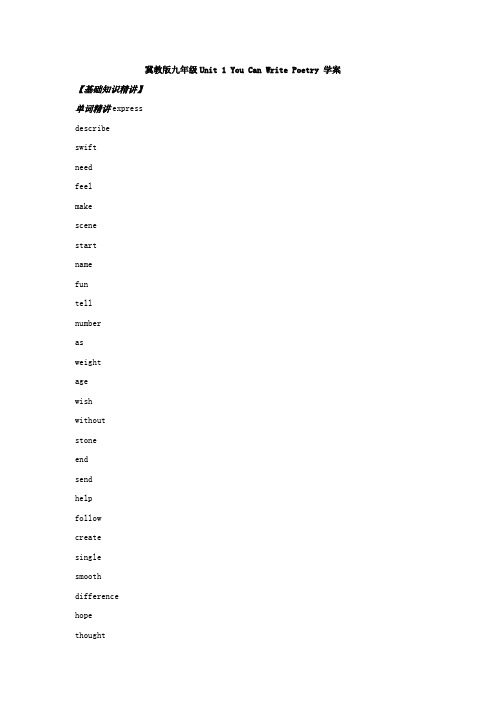
冀教版九年级Unit 1 You Can Write Poetry 学案【基础知识精讲】单词精讲expressdescribeswiftneedfeelmakescenestartnamefuntellnumberasweightagewishwithoutstoneendsendhelpfollowcreatesinglesmoothdifferencehopethoughtancientenoughsurprisesuremelt词组精讲be input onbe dressed inthink ofthink aboutthink overat the end ofbring sth to an endcome to an endin the endend intell a storymake a jokemake a joke about sb /sth play a joke on sbmake fun offor funhave funas followsfollow afterlook afterlook intolook uplook outlook down uponlook up tolook forlook overlearn /know sth by hearta set number of【重点知识拓展】Would sb like to do sth ?Sb would like to do sth .Both ……and ……Either……or……Neither…….nor……What should sb want to do if sb would like to do sth ?Make sb /sth adjAs …….asSb expect to do sthIt’s one’s turn to do sth .【中考考点衔接】选择填空(11) I'll arrive in ______ hour.A. aB. anC. 不填 ( )(12) They got to the moon ______ spaceship.A. onB. atC. by ( )(13) Mary helps me ______ my English.A. toB. forC. with ( )(14) ______ good boy he is!A. What aB. WhatC. How ( )(15) Liszt gave her some ______.A. advicesB. adviceC. of advices ( )(16) I can't work out the me ______.A. think it overB. think itC. think of it ( )(17) Can you tell me where ______?A. is the zooB. the zooC. the zoo is ( )(18) English ______ in many schools in our country.A. is taughtB. taughtC. has taught ( )(19) I don't want the bad smells ______.A. terribleB. niceC. nothing ( )(20) In spring it gets ______.A. warm and warmB. more warmC. warmer and warmer ( )。
- 1、下载文档前请自行甄别文档内容的完整性,平台不提供额外的编辑、内容补充、找答案等附加服务。
- 2、"仅部分预览"的文档,不可在线预览部分如存在完整性等问题,可反馈申请退款(可完整预览的文档不适用该条件!)。
- 3、如文档侵犯您的权益,请联系客服反馈,我们会尽快为您处理(人工客服工作时间:9:00-18:30)。
Unit1 You Can Write Poetry
Lesson 1: Poetry, Please
Teaching Content:
Mastery words and expressions: poem, decide, nature, express, learn/know …by heart, pleased, happiness, shut
Oral words and expressions: poetry, description, continue, beyond
Teaching Aims:
1. Learn about the poems in foreign countries.
2. Know the differences between Chinese and foreign poetry.
Teaching Important Points:
1. How to make suggestions.
2. The grammar: infinitives.
3. Some words and expressions: learn/know …by heart
Teaching Difficult Points:
The grammar: infinitives
Teaching Preparation: pictures
Teaching Aids: audiotape, flashcards, pictures
Type of lesson: new lesson
Teaching Procedure:
Step1. Come to “THINK AOBUT IT”.
Let the students talk about the questions in groups.
1. Have you written a poem in Chinese? Is it hard? Why?
2. What kinds of poetry do you like best?
After a while, let the students in each group present their ideas to the class in front of the class.
Step2. Listen to the tape and find the answers to the questions:
1. Have Brian finished his poem?
2. What’s Danny’s poem about?
Step3.Reading task:
1. Read the text and underline the new words in this lesson.
Present the meanings of the words with the help of the media computer. We can use our body language if necessary.
3. Tell the main idea of this lesson.
Step4. Read the text again and decide the statements are true or false.
1. Jenny wrote a Chinese poem.
2. Brian wrote a poem about nature.
3. Danny learned his poem by heart.
Step5. Deal with the language points.
How to make a suggestion:
Maybe you could write a description of your favourite place.
The infinitives:
I haven’t decided what to write about.
Would you like to hear my poem?
Do you really want to hear?
I don’t need to read it.
Let the students sum the use of infinitives of this lesson. Then encourage them to make more sentences with the grammar.
Step5. Activities
1. Divide the class into several groups. Then let them translate a Chinese poem written by Li Bai or other famous poets. Then compare the tr anslations of the groups. Let’s see which is the best.
2. Each group writes an English poem about the familiar things around us. Then let them change the poems in groups. They may give their own advice to the poems written by others.
Step6. Describe the picture in English.
Ask the students work in their formal groups. Then let them read their poems in class loudly.
e to “LET’S DO IT”.
Work with a partner. Let the students talk about the question: which do you think is more difficult to understand, English poetry or Chinese poetry?
All of the students have seen much Chinese poetry, but few of them have seen English poetry. So present the students several English poems. Let them discuss the mean ideas of the poems. Then let them finish the task.
Step8. Homework
1. Finish off the activity book.
2. Get more information about the English poetry after class.
Summary:
The students more little of the English, so that the teacher provides them more information about the English poetry is very necessary. We can use the Internet to help us. The teacher should stimulate the students’ interests about the English poetry. The students can have more time to search more information on the Internet after class.。
